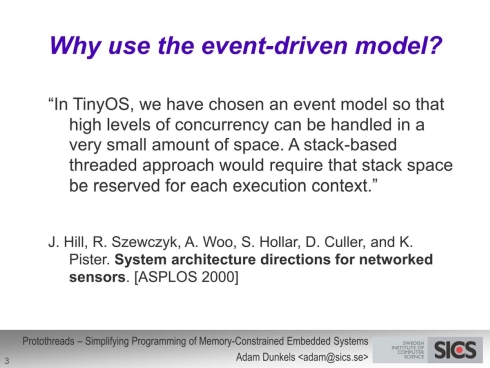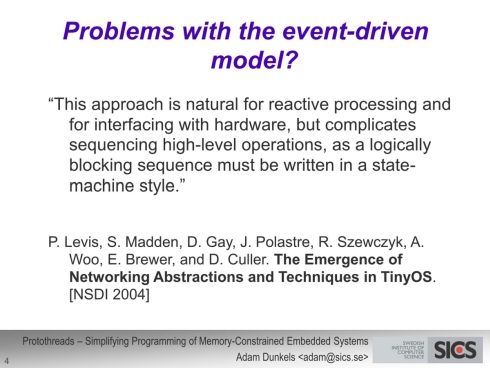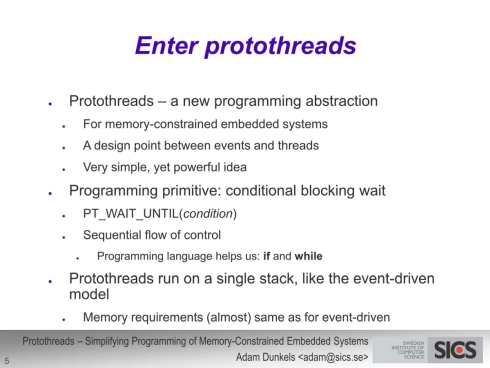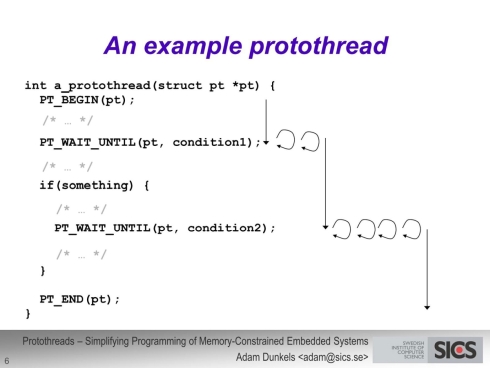Fiberもどきの「Protothreads」は既存RTOSとの組み合わせで力を発揮する:リアルタイムOS列伝(43)(2/3 ページ)
「もっと手軽にEvent-Drivenを記述したい」
何しろSRAMが2KBしかないとすれば、TCB(Thread Control Block)が消費するであろう100バイトすら“lots” of memory扱いになるのも無理ないところである。ただし、そういうMemory-Constrained Networked Embedded DeviceのプログラミングにはEvent-driven Modelの方が適している(Photo02)(図3)。その一方で、これをPreemptiveの構成でやろうとするとState Machineを作るような構造になるのもまた事実だ(図4)。
 図3 “stack-based threaded approach”は要するに割り込みが入ったら現在のContextをStackに積んでISRに飛んで割り込みのハンドリングを行い、終わったらStackからContextを復帰させて処理を再開するという従来型の方法のことである[クリックで拡大] 出所:Adam Dunkels氏の論文
図3 “stack-based threaded approach”は要するに割り込みが入ったら現在のContextをStackに積んでISRに飛んで割り込みのハンドリングを行い、終わったらStackからContextを復帰させて処理を再開するという従来型の方法のことである[クリックで拡大] 出所:Adam Dunkels氏の論文もちろん、大規模なシステムであればこれらのコストはさほど大きくないが、何しろMemory-Constrained Networked Embedded Device相手だから、この際多少の安全性の欠如には目を瞑っても、もっと手軽にEvent-Drivenを記述したい、というのがProtothreadsの開発動機である(図5)。
では具体的には? という例が図6になる。あるThread(というか、実はThreadである必要もなく、ProcessでもTaskでもいいのだが)がスタートしたら、後は前処理→PT_WAIT_UNTILで待機→……という簡単な方法でEvent Drivenが記述できる。
もう少し具体的なサンプルがリスト1だ。これはexample-small.cとして提供されているもので、main()の中でprotothread1()とprotothread2()を無限ループで呼んでいるだけである。で、protothread1()はprotothread2()がflagを立てるのを待って自分のflagを立て、protothread2()は逆にprotothread1()がflagを立てるのをまって自分のflagを立て、という単純な仕組みである。
/**
* This is a very small example that shows how to use
* protothreads. The program consists of two protothreads that wait
* for each other to toggle a variable.
*/
/* We must always include pt.h in our protothreads code. */
#include "pt.h"
#include <stdio.h> /* For printf(). */
/* Two flags that the two protothread functions use. */
static int protothread1_flag, protothread2_flag;
/**
* The first protothread function. A protothread function must always
* return an integer, but must never explicitly return - returning is
* performed inside the protothread statements.
*
* The protothread function is driven by the main loop further down in
* the code.
*/
static int
protothread1(struct pt *pt)
{
/* A protothread function must begin with PT_BEGIN() which takes a
pointer to a struct pt. */
PT_BEGIN(pt);
/* We loop forever here. */
while(1) {
/* Wait until the other protothread has set its flag. */
PT_WAIT_UNTIL(pt, protothread2_flag != 0);
printf("Protothread 1 running\n");
/* We then reset the other protothread's flag, and set our own
flag so that the other protothread can run. */
protothread2_flag = 0;
protothread1_flag = 1;
/* And we loop. */
}
/* All protothread functions must end with PT_END() which takes a
pointer to a struct pt. */
PT_END(pt);
}
/**
* The second protothread function. This is almost the same as the
* first one.
*/
static int
protothread2(struct pt *pt)
{
PT_BEGIN(pt);
while(1) {
/* Let the other protothread run. */
protothread2_flag = 1;
/* Wait until the other protothread has set its flag. */
PT_WAIT_UNTIL(pt, protothread1_flag != 0);
printf("Protothread 2 running\n");
/* We then reset the other protothread's flag. */
protothread1_flag = 0;
/* And we loop. */
}
PT_END(pt);
}
/**
* Finally, we have the main loop. Here is where the protothreads are
* initialized and scheduled. First, however, we define the
* protothread state variables pt1 and pt2, which hold the state of
* the two protothreads.
*/
static struct pt pt1, pt2;
int
main(void)
{
/* Initialize the protothread state variables with PT_INIT(). */
PT_INIT(&pt1);
PT_INIT(&pt2);
/*
* Then we schedule the two protothreads by repeatedly calling their
* protothread functions and passing a pointer to the protothread
* state variables as arguments.
*/
while(1) {
protothread1(&pt1);
protothread2(&pt2);
}
}
通常ならこれはcreate_thread()あたりを使って親プロセスの下にThread 1/2を生成し(Thread 0は親プロセスそのもの)、Thread 1/2同士でSemaphoreないしEvent Flagなりを使って排他制御を行う格好になる(ThreadをサポートしてないOSなら、create_process()で子プロセスを2つ作るか、それもなければTaskを2つ新規生成する)が、Protothreadsでは一切新規のTask/Process/Threadを生成せずにこれを実現できる、という仕組みだ。
Copyright © ITmedia, Inc. All Rights Reserved.
組み込み開発の記事ランキング
- フォックスコンがフィジカルAIで実現する「AX」とは、NVIDIAと川崎重工も講演
- 時代はDXからAIが当たり前に浸透する「IX」に突入へ CES 2026の内容をひもとく
- いまさら聞けないエッジAIとクラウドAIの違い “現場処理回帰”の必然性とは
- 愛猫の不調を見逃さない、LIXILが非接触呼吸計測デバイスを開発
- 生成AI実行時の消費電力が10W以下に SiMa.aiのSoC「Modalix」の実証結果を公開
- 1μF以下の極小コンデンサーでも安定動作する500mA対応LDOレギュレーター
- 高速起動とREST APIで高性能なデータ取得を自動化する測定コア
- 105℃の高温に対応する細径高屈曲ロボットケーブルを発売
- 汎用のER電池とサイズ互換がある全固体電池モジュール、出力電圧も3.6Vに変換
- テスト消化曲線とバグ発生曲線の7パターン診断
コーナーリンク






